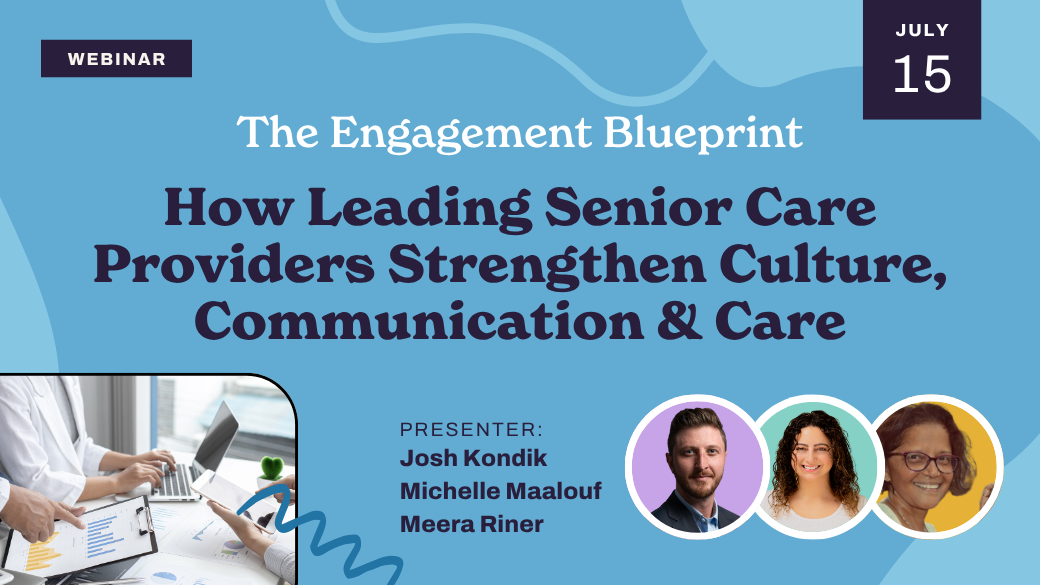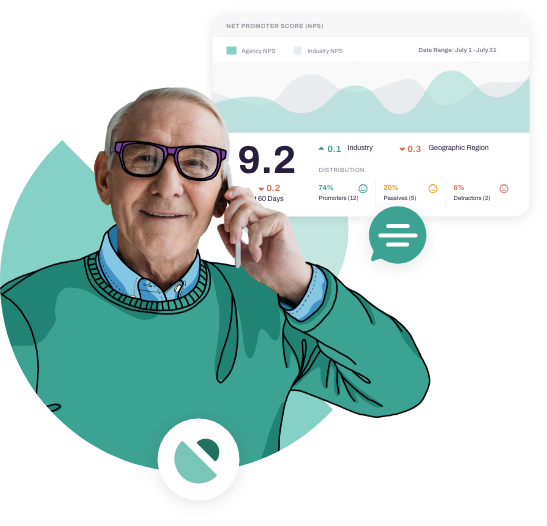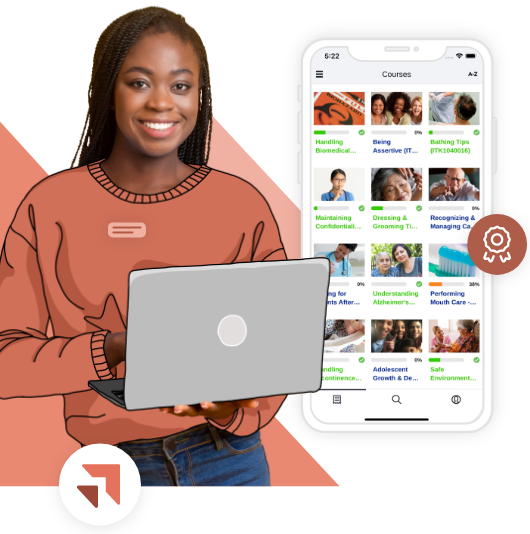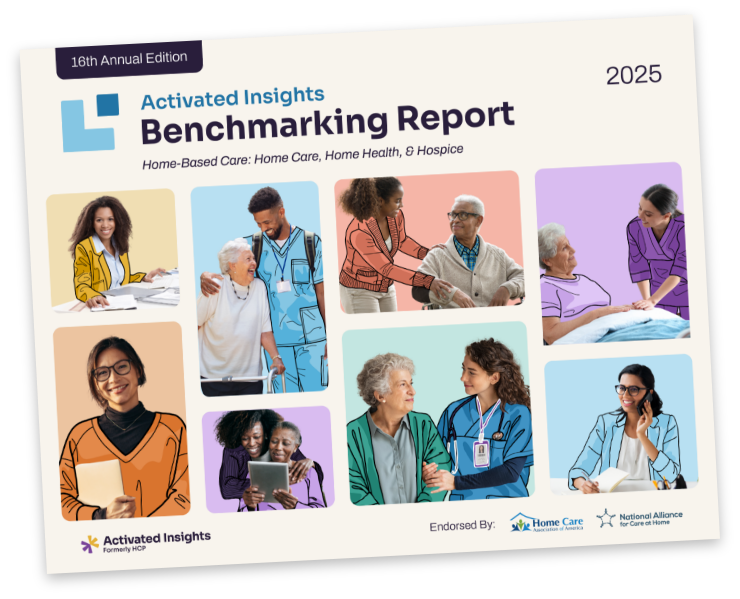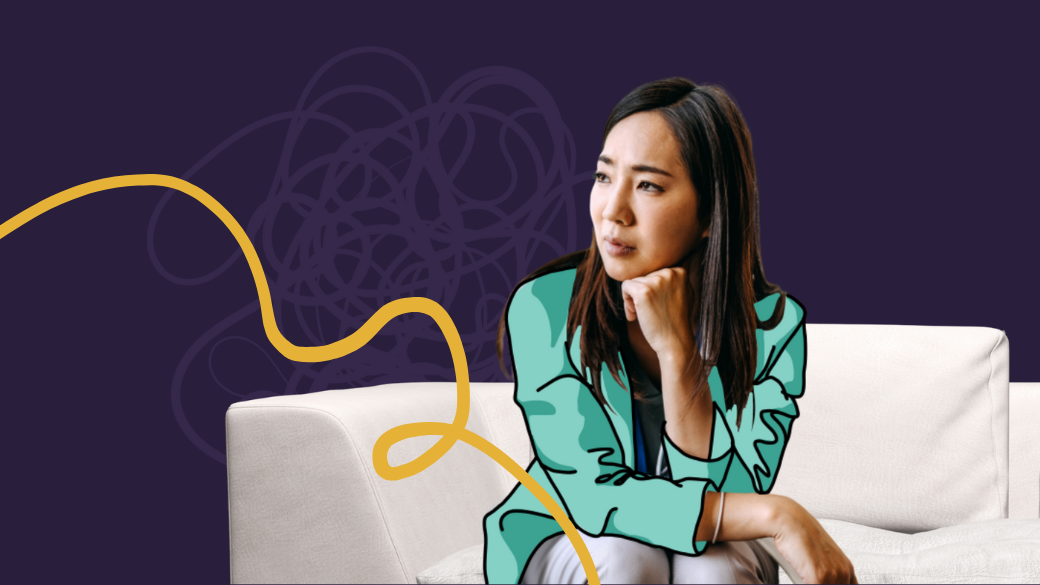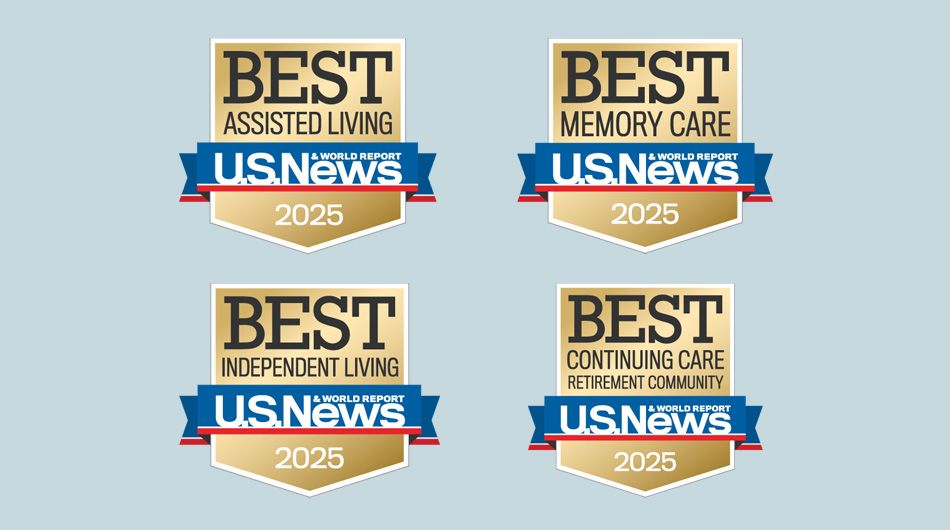Cure the caregiver shortage industry-wide epidemic by tackling the number one complaint from caregivers around North America.
From 5th position in 2019, to 3rd in 2020, and now taking the #1 spot this year—lack of training has jumped to the top of the list of caregiver complaints in the last 3 years, according to the most recent Activated Insights Benchmarking Report.
The vote among home care agency owners is unanimous: training has never been more important.
Which is why we’ve collected everything you need to know, from starting a professional training program to evaluating your curriculum’s Return on Investment, and everything in between in our Ultimate Guide to Caregiver Training:
This guide will train you to turn your caregivers’ number one complaint into your agency’s best marketing, recruitment, and retention asset.
Why You Need a Professional Training Program
Like any good investment, training your caregivers will reap rewards for years to come. A refined training program:
What to Include in Your Training Program
Now that you know the benefits of training, you may be asking: Where do I start? What do my caregivers really need and want to be trained in?
We surveyed over 760 home care providers, representing over 1,461 locations, to find out.
According to our research, a successful training program must include:
Let’s break it down.
Basics of Caregiving
According to the 2022 Activated Insights Benchmarking Report, agencies are providing training in at least 10 of the following basic topics:
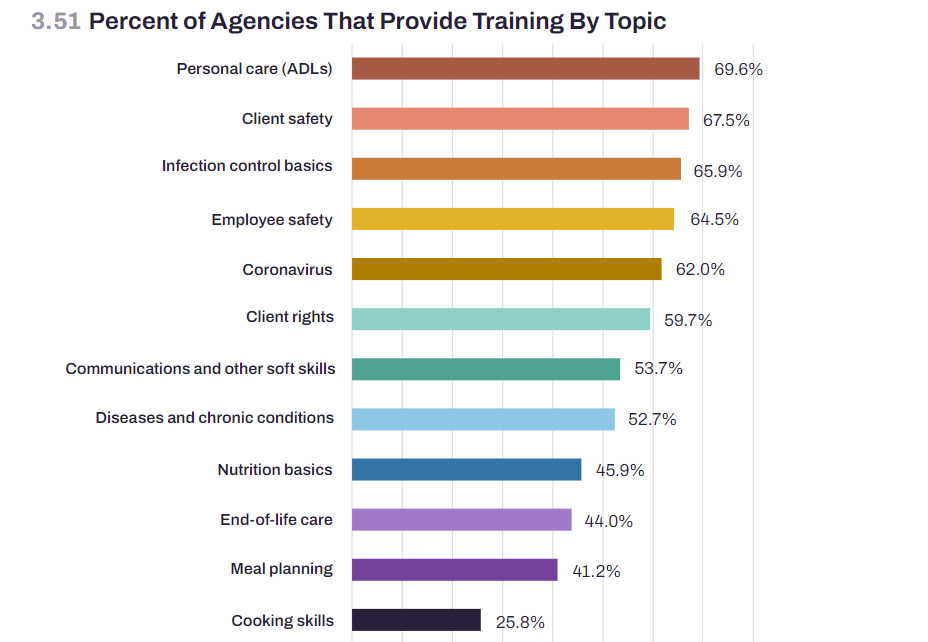
If you’d like to train your caregivers to stand out beyond the industry’s necessary skillset, consider adding a few of the most popular training topics among caregivers and clients alike.
While all these suggestions are a good place to start as you develop your caregiver training curriculum, don’t forget to ask the caregivers at your agency what training would benefit them the most. Their specific feedback will help you keep a pulse on your clients’ specific needs and prepare for which topics are most prevalent in your area straight from the source.
Specialty Care Courses
According to the National Caregiver Trend Report from myCNAjobs, 73% of employees enter the caregiving profession as a steppingstone to gain the skills needed to pursue a career in nursing or healthcare.
That means nearly ¾ of your caregivers have agreed to work for your agency with the expectation that they can advance their skills. Choosing personalized training courses that cater to both your caregivers’ interests and your clients’ needs will not only drive job satisfaction, but dramatically increase your agency’s appeal to job seekers.
83% of all home care providers now offer specialized training courses, understanding they strengthen your employer brand, attract long-term caregivers, and deliver what the caregiving demographic is expecting.
Ensure your agency offers the most popular specialty training topics on the market, such as Alzheimer’s, Dementia, palliative care, behavioral health, infection control, reducing readmissions, and restorative care.

Reposition the caregiving occupation as an opportunity for unparalleled career growth and increase the scope of clients your agency can care for. Offering specialty care training courses positions your agency as an employer who invests in their employees’ knowledge and skill development like no other job on the market can.
Alzheimer’s and Dementia Training
As shown above, over 75% of all surveyed home care agencies offer their caregivers specialty care training in Alzheimer’s and Dementia. This is because 1 in every 3 seniors dies with the disease—and it’s a number that isn’t slowing down.
According to the Alzheimer’s Association, 12.7 million people age 65 and older are projected to have Alzheimer’s by the year 2050.
The changes that occur because of Alzheimer’s disease can be challenging, confusing, and frightening to clients and their families. Caregivers who are trained to care for the unique needs of clients with the disease can help alleviate these feelings.
According to our surveys, caregivers with a lack of proper training on the subject find the following tasks the most challenging: handling violent or abusive behaviors, trouble communicating, challenging emotions, finding appropriate activities, and feeding/eating challenges.
Activated Insights Training is recognized by the Alzheimer’s Association because it aligns with their evidence-based Dementia Care Practice Recommendations for quality care. These recommendations are based on a comprehensive review of current evidence, best practices, and expert opinion.
Specifically, the Alzheimer’s Association recognizes the following courses in our training library:
Agencies that utilize Activated Insights Training gain unlimited access to individual courses and a complete Alzheimer’s and Dementia Learning Path. Plus, caregivers who complete the entire learning path receive an Alzheimer’s and Dementia Care Specialist certificate.
Soft Skills—Why Hard Skills Alone Aren’t Enough Anymore
We asked caregivers to tell us the hardest part about their job. We assumed their answers would center around low pay, inconsistent hours, or handling their clients’ needs.
However, the majority stated that they found it most challenging to keep a positive attitude and deal with all different types of personalities. And when asked which professional skill they’d most like to improve, the majority of respondents said, “communicating with co-workers.”
Which means your caregivers are craving soft skills training in the workplace.
While 92% of employers think soft skills are just as important as technical skills, our most recent Activated Insights Benchmarking report shows that only 54% of providers currently offer soft skills training to their employees.
As 68% of home care providers currently use a professional training program, adding soft skills training to your curriculum list is easier than you think. Activated Insights Training rose to the most used training program in the industry this year and offers soft skill courses in all the following areas:
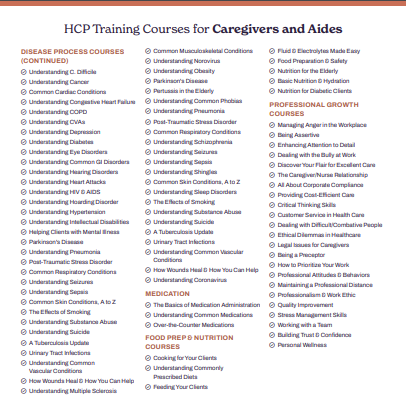
(Note: To take a closer look at the image above, right-click to “open in new tab.”)
Become one of the first agencies to offer soft skills training to your employees and see a 250% return on investment with increased productivity and retention.
Blended Learning Options
The pandemic changed how home care agency owners all around the world do business—but especially when it comes to how they train their employees.
Since 2020, half of all agencies have introduced online courses into their training program to evolve with the challenges presented during the pandemic. The benefits of blended learning have since outlasted COVID because it:
Even though almost 70% of home care providers use a professional training program, Activated Insights Training is the only training provider to offer both online and hands-on learning.
How to Increase Your Caregiver Training Completion Rate
When you’ve spent this much time, energy, and resources into creating the perfect training program—don’t let it go to waste!
94% of employees would stay with a company longer if they felt their employer encouraged their learning and development.
These 7 easy techniques will motivate your caregivers to not only complete their training with ease, but actually look forward to it:
Make Training Easier to Access with Blended Learning
Why this works:
Caregivers lead very busy lives: over 80% of them are working for multiple agencies to make ends meet. It can be hard for caregivers to find time to complete training and soak in all the information presented to them.
As an employer, you can simplify training for your caregivers by offering training that accommodates their schedules and learning preferences.
How to motivate your caregivers with it:
Display your training flexibility by offering blended learning options that allow each caregiver to learn at their own pace.
We believe blended learning is crucial for a successful training program—which is why Activated Insights Training is the only provider to offer a true blended solution that includes both online and hands-on learning.
Enable Caregivers to Specialize in Their Interests
Why this works:
Personalized training shifts the focus beyond compliance and shows your caregivers that you are making an investment in their growth.
70% of employees would leave their current job to work for an organization that invested in employee development and learning. Yet, many employers find themselves clipping their employees’ wings in an effort to make them stay longer.
In today’s competitive job market, businesses are offering unprecedented bonuses, benefits, and wages, making it difficult for most home care agencies to compete. Stand out as an employer of choice by offering what entry-level employees really want: career development.
If you want to keep loyal employees, invest in their individual potential by enabling them to specialize in topics of their choice.
How to motivate your caregivers with it:
You can be known as the agency that prepares, equips, and advances their employees simply by reconstructing your definition of training. Use training as an opportunity to build your caregivers into confident experts from the ground up, while simultaneously improving your clients’ care and satisfaction.
Help your caregivers to envision how working with your agency will launch their career:
Along with increased caregiver retention, training your caregivers to specialize in their interests and client needs will equip your agency to provide better care to your clients.
Cultivate a Safe Space for Questions
Why this works:
As they say in the home care industry: don’t wait until it’s too late to teach your caregivers how to use a Hoyer lift—or at least we should start saying it, because it’s becoming a real problem.
Although caregivers want to begin their first shift as soon as possible, they’d prefer their client’s home to not be their first training room. In fact, alongside lack of training, caregivers ranked lack of communication as their top complaint.
Caregivers want to feel more prepared going into the field and need a welcoming environment in which to ask questions.
How to motivate your caregivers with it:
Intentionally set your agency up to banish the idea of “stupid” questions so that your caregivers feel more equipped to tackle the tasks their clients require of them.
Use training as an opportunity for caregivers to bring specific client questions and concerns to the table—before they need to learn how to use a Hoyer lift:
As much as training is about teaching, let it also be a time for listening. Giving space to hear your caregivers’ questions will help you know what skills your clients require. You’ll be able to fine-tune your training program while you cultivate a culture of open dialogue.
Make Training Fun with Gamification
Why this works:
From the apps that reward you for hitting your daily step goals to the free coffee you get after 10 visits, gamification is intertwined in every aspect of life, making mundane tasks a little more satisfying to complete.
Every time we make an accomplishment, hit a goal, or complete a task, our brain releases dopamine to make us feel good about doing it and encourage us to do it again. Gamification is the process of enhancing these dopamine surges by adding game-like features into non-game settings to encourage engagement and motivate interaction.
It’s no surprise, then, that gamified training programs have a 94% completion rate.
How to motivate your caregivers with it:
People learn better when they are having fun. Help your caregivers want to complete training by rewarding them with a dopamine surge throughout the experience.
Gamify your training program to naturally incentivize the feel-good chemicals in your caregivers’ brains:
Not only will gamified training help your caregivers feel like they are in control of their learning, but it will help them retain the information they learn in a more fun and interactive way.
Pick the Right Personality to Break the Ice for Your Caregivers
Why this works:
Caregiving in the field can already feel isolating enough—your training doesn’t have to be. Instead, training should set the tone that your caregivers are a part of a supportive community of coworkers.
Encouraging your caregivers to connect with each other establishes camaraderie and lays the foundation for relationships to be built in a positive work culture.
How to motivate your caregivers with it:
When choosing the perfect person for your training position, ensure your candidate is friendly, conversational, and loves leading group discussions.
Daisy Dalegowski, Director of Nursing at BrightStar Care of Metro Denver, explains why the energy of your trainer matters:
“Everyone has been a part of a mandatory meeting where you can tell the person standing in front of you does not want to be there. You can feel it in the way that they deliver the message, in the way that they have prepared their PowerPoints, and in the way the room is prepared. The vibe is evident as soon as you walk in the door. You know when someone is just going through the motions to check off a box versus when someone is super excited to be there, see me, and share because they make a conversation and try to engage with me. So, if the person who’s in charge of training does not enjoy what they’re doing, it is going to be a huge waste of everyone’s time.”
Cultivate a Positive In-Person Training Environment
Why this works:
Dalegowski continues to explain that nobody learns best in a stiff, uncomfortable, or anxious environment—especially when they’re feeling vulnerable in a new role.
When your new hires are scheduled for their first training shift, they may be attending apprehensively as they don’t know what to expect. However, getting your caregivers to show up to their first shift is a big deal and shouldn’t go unrewarded. Creating a welcoming learning environment puts your caregivers’ nerves at ease by allowing them to feel comfortable being vulnerable starting a new role.
How to motivate your caregivers with it:
Enable your caregivers to do their best learning by intentionally designing a welcoming learning environment:
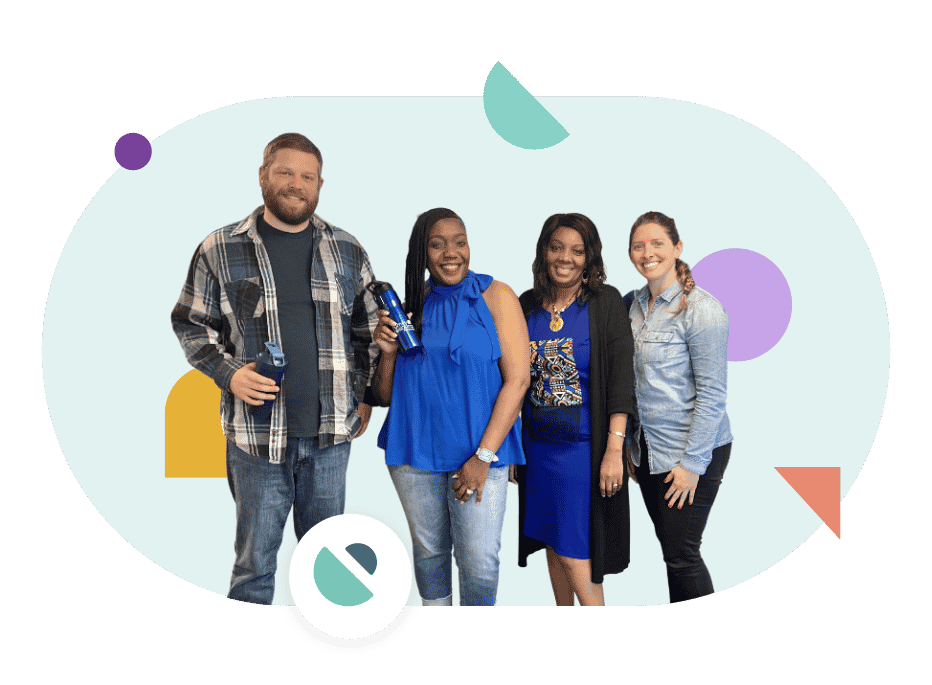
Reward Caregivers for Completing Trainings
Why this works:
You’ve heard that people go where they are appreciated; are your caregivers feeling the love?
Companies with incentive programs saw a 79% success rate in achieving their goals when the correct reward was offered and found that employee performance improved by 44%.
This is because rewards validate the effort behind completing a task, resulting in your employees feeling appreciated. Recognizing your employees’ accomplishments will help your caregivers feel valued as priceless assets instead of replaceable commodities.
How to motivate your caregivers with it:
First, be sure to thank your caregivers for the time they put into training. Their effort to improve their skills is a direct benefit to your agency and shouldn’t be taken for granted.
Recognize the value your caregivers bring to your agency by:
Jensen Jones and Jill Scott put it best in our 2021 Benchmarking Study, “We all like to feel appreciated. I wish there were a better word besides retention when talking about keeping our most valued employees. Nobody wants to be retained; they want to be invested in, and they want to be seen and valued. Employees want to feel like they’re a part of something bigger than themselves.”
How to Evaluate Your Training Program’s Success
As nearly 70% of providers are currently using a professional training program, you’ll want to make sure yours measures up. Audit your training program by evaluating it against these top metrics to see if it’s living up to its fullest potential:
Your Program Offers at Least 8 of the Basic Training Topics
As the caregiver turnover rate stayed at 65% this year, it is projected that the average agency will have to hire 81 caregivers by the end of the year—unless your training program is working how it should.
Since over half of all caregiver turnover happens within their first 3 months of employment, the average agency’s current training program isn’t setting caregivers up for success. You have less than 12 weeks to equip your caregivers with the skills they need to be convinced that they can handle the job.
Over half of all home care agencies currently offer their caregivers training in the following 8 topics: personal care (ADLs), client safety, infection control basics, employee safety, Coronavirus, client rights, communications and other soft skills, and diseases and chronic conditions.
Carefully assess your caregivers’ individual needs to ensure you’re providing topics that will take them from competent, to proficient, to an expert in their role in their first year.
Download our free Learning Ladder resource to learn how you can tailor your training topics to your caregivers’ specific needs.
Your Program Includes an Above-Average Amount of Both Orientation and Ongoing Training
How much training do your caregivers actually need to succeed?
If you want to make over $700,000 more in revenue, you’ll need a certain amount of both orientation and ongoing training. We’ve calculated the magic number that ensures your caregivers perform at their highest level while giving you the best bang for your buck.
The average agency currently provides 5 hours of orientation training and 8 hours of ongoing training. Yet agencies that offer at least 8 hours of training in orientation and 12 ongoing training hours see an increase of $701,072 in revenue each year compared to agencies who only train the minimum hours needed for compliance or to fulfill state regulations.

With the above suggested basic and specialty courses, you’ll fill up 20 hours of training in no time, and your caregivers, clients, and checkbook will thank you for it.
You Offer Your Caregivers Specialty Training Courses
It’s no secret that offering your caregivers advanced training courses significantly reduces turnover, as it encourages them to progress upward along your company’s career ladder.
In fact, over 82% of agencies jumped on board in 2021 to provide their caregivers with advanced training options that cover topics beyond the required basic skills.
Which advanced training topics are worth investing in?
7 popular topics are hitting the charts.
According to the 2022 Activated Insights Benchmarking Report, over 75% of agencies offer specialized training in Alzheimer’s and dementia. Providers are also offering courses in palliative care, behavioral health, infection control, reducing readmissions, and restorative care.

While offering specialty training courses may feel like an optional luxury for your agency, clients and caregivers everywhere are beginning to expect these courses—so start adding a few more advanced topics to your training program for optimal satisfaction.
You Have a High Training Completion Rate
It’s one thing to implement a training program, it’s another to motivate your caregivers to complete it. You can have the most successful training program on paper, but if your caregivers don’t recognize the benefit of it, you’re wasting your resources.
The most effective strategy guaranteed to boost graduates from your agency’s training program is to pay them for their time. Ensure your training competition rate is 100% by catering your training program to fit your caregivers’ needs.
You Provide Both Online and In-Person Training Options
70% of millennials have left or considered leaving a job because it lacked flexible work options—and the home care industry is no different.
Home care agencies have evolved with the demands of the pandemic by providing online training options into their programs.
But do you still need online and in-person training options?
From the outside, they seem to produce similar results, but as we discussed earlier, each type of training has its own advantages. Caregivers are proven to benefit from both an online and hands-on learning approach, meaning if you haven’t added blended learning options to your training program, now is the time.
Want both options all in one place? Activated Insights Training is the only provider to offer a true blended solution that includes both online and hands-on learning.
Ultimately, the success of your training program can only be determined by your caregivers. Act upon their feedback on your training program to ensure your investment is paying off.
Calculating Your Training ROI
The most successful long-term caregivers were once new hires—the only factor that prevented them from contributing to the 65% turnover rate is an agency that invested in their potential.
See a guaranteed Return on Investment by turning this ultimate training guide into your agency’s reality. Ranked as the top professional training program used by the most providers in 2021, Activated Insights Training enables your agency to invest in the potential and success of your caregivers by getting them certified.
By following these steps, training will transform from your caregivers’ number one complaint into their most-valued part of the job. Together, we can revolutionize your agency, the home care industry, and the lives of millions by investing in one caregiver’s future at a time.
Learn more:
Related Posts




